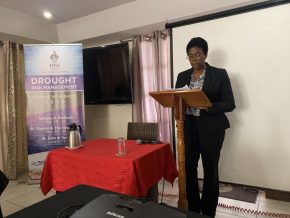The Drought Risk Management Training workshop in St Vincent and the Grenadines was developed by a joint effort among the Caribbean WaterNet /CapNet UNDP, Global Water Partnership Caribbean (GWP-C) and the Business Development Unit, Faculty of Food and Agriculture, University of the West Indies, St Augustine Campus (BDU-FFA-UWI) with the purpose of building capacity as it pertains to water resource management in the Caribbean region.
Twenty-one participants from various sectors including water quality and distribution, Public health, Education, Conservation, Forestry, Agriculture, Disaster Management and Non-Governmental organizations participated in the workshop. Having the education sector represented as it is key sector often disregarded in disaster risk management was a success factor for this workshop.
The workshop’s course content and sessions were facilitated by three specialists, Professor Jacob Opadeyi, Dr. Ronald Roopnarine and Dr. Gaius Eudoxie. During the workshop, participants were exposed to the following elements of Disaster Risk Management:
-Drought Risk Management in the Caribbean (Past and Present)
-Drought Risk Occurrence, Vulnerability and IWRM
-Vulnerability and Impacts of Droughts
-Drought Risk Management Framework
-Drought Risk Characterization and Monitoring Using Remote Sensing
-Drought Preparedness, Emergency Management and Recovery
-Crisis management Vs Risk Management
-Participatory approach to Disaster Risk Management
-Early Warning Systems
Ms. Debbie Daniel, Agriculture Planning Officer in the Ministry of Agriculture, Forestry, Fisheries, Rural Transformation, Industry and Labour emphasized the importance of the Sendai framework and the Hyogo protocol highlighting the need for disaster risk management capacity building in the islands of St Vincent and the Grenadines during her opening remarks.
 Ms. Debbie Daniel
Ms. Debbie Daniel
Drought was established as a major concern in St Vincent and the Grenadines during the training, with impacts on Biodiversity/wildlife, Agriculture, Health, Economy. Specific mention was made of the Grenadines, where the main source rainwater harvesting is the main source of water rendering the inhabitants particularly vulnerable in instances of reduced rainfall.
Facilitators explained the characteristics of droughts and the possibility of future occurrence as droughts have had and can have serious impacts on the island. This led to a mind mapping exercise to identify local indicators of droughts on the islands:
-Meteorological office warning
-Media/radio announcements
-Visual dry vegetation
-Sightings of species looking for water, e.g. black snakes, agouti, iguanas
-Stream flows reduced
-Reduction in production of root crops as well as increased prices
-Snapping of banana and plantain trees
-Vegetables become scarce.
Various mitigation measures were identified as part of the module on strategic planning. The representative from the Central Water and Sewerage Authority (CWSA) stressed the need for the enforcement of the relevant act, reduction in the domestic misuse of standpipes, proper facility and infrastructure management to reduce leakage, enforcement of water conservation policy and the creation of incentives such as duty free concession/tax reductions. The Agriculture sector suggested the planting of drought tolerant crop varieties; irrigation and increase of water storage (more tanks) on farms. National Parks suggested a reduction in cropping area spacing and crop area, penalties for deforestation, incentives for reforestation in upper watershed areas and improve water use efficiency. The Public Health Department suggested the use of feed lot systems, promotion of drought awareness program for the general public and the introduction of protocol to inform water distribution as it pertains to miscellaneous water distribution.
During the workshop, the challenges towards achieving improved drought risk management on the islands were identified:
-Weak Institutional coordination.
-Cycle of recovery vs preparedness.
-Lack of support from decision makers.
-Cultural Rigidity
“A more proactive approach to dealing with disaster management should be focused on risk management rather than crisis management” said Mrs. Tasheka Haynes-Bobb – National Coordinator, GEF Small Grants Programme, St. Vincent and the Grenadines- while doing some remarks specifically focused on the dire need for the islands to better manage impacts associated with drought.
Moreover, the participants were then introduced to the five elements of the United Nations International system for Disaster Reduction (UNIDSR); the Sendai Framework and its seven global targets. The importance of monitoring and data to inform decisions was stressed. It was noted that the disaster response frameworks that are presently being used in the Caribbean are not risk management frameworks. This mechanism does not address the issues of risk as focus is more on crisis management.
